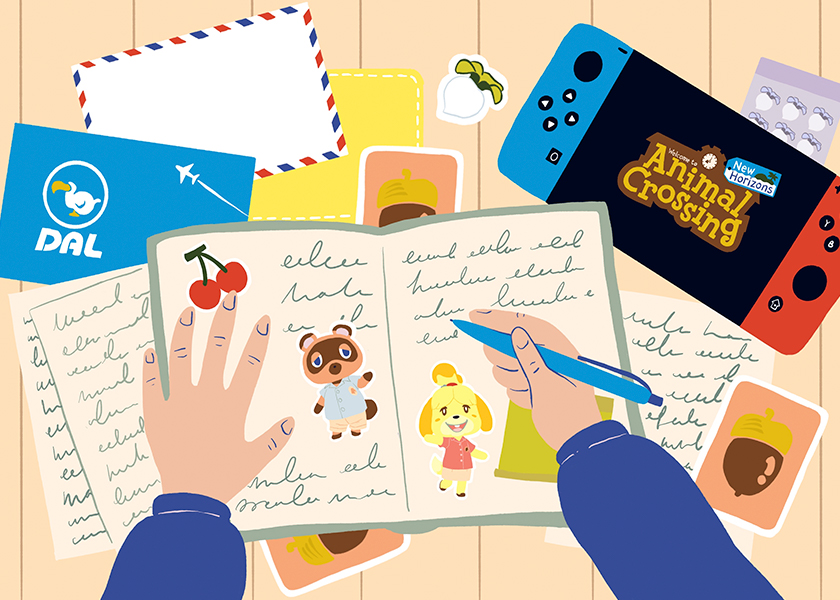- Home |
- Search Results |
- Why so many authors are falling for Animal Crossing

Are you, by chance, spending your time gathering sticks or catching fish? Perhaps you’re filling a museum with artefacts, or campaigning for a beloved pop star to play a concert. Don’t fret - none of the above would breach social distancing rules: they’re all activities from Animal Crossing, a computer game that can be played comfortably from home.
Since the corona virus struck the world, millions of people have been keeping themselves busy with the infinitely pleasant Animal Crossing, a game where you are the only humanoid in a world full of adorable creatures, where nobody dies and financial ruin is impossible. No wonder the Nintendo creation has experienced a colossal uptick in players – and people sharing their playing experiences online – in the midst of a pandemic.
There are a number of authors who have fallen into the pastel-coloured safety net of New Horizons, the latest iteration of the game, too. Juno Dawson’s a fan, and Stephen Fry caused a social media ruckus when he popped up on Twitter announcing he had ‘started this thing called #AnimalCrossing’, asking ‘is it a metaphor for life itself?’ Much as Fry was seeking deeper meaning in activities such as the turnip stock market (the closest one can get to gambling, or indeed any kind of vice, in the game), other storytellers have found themselves connecting with the narrative possibilities granted by Animal Crossing.
'It was a deeply personal thing that I wanted to put on the page'
For the uninitiated: to arrive on Animal Crossing is to be landed with a debt to a character named Tom Nook in order to live in a one-room house. Nothing bad happens if you don’t pay him back, but if the player does – via means of gathering sticks or plants from around the island – they can upgrade their house. In New Horizons, the overarching goal for some is to get their island a five-star rating, achieved through making it look lovely and having assets such as a museum full of curios. But you can also just pootle around having picnics with your animal friends.
As Amy Jones, author of The To-Do List and Other Debacles and decade-long Animal Crossing devotee, attests: ‘There’s no real point to it, you can kind of do what you want.’
Jones says she enjoys Animal Crossing’s surprising hidden depths: while as the player, you are the only humanoid on the island, it doesn’t mean that there aren’t benefits to emerge from getting to know your animal populace. ‘There are so many hidden stories in the game,’ she says. ‘Every new iteration of Animal Crossing will reveal new narratives, such as a history of the Able Sisters (the hedgehogs who run the clothing shop) and the backstory of museum director Blathers, an owl who gave up the opportunity to do a PhD.’
'Murder mystery plots are very controlled, and Animal Crossing offers the same thing'
It’s bizarre backstories like these that make Animal Crossing more imaginative than it may initially seem, she adds: ‘Not only do you get to discover those stories but you do get to create this world, I find myself inventing my own narratives for the characters.’ She cites a gym fanatic mouse named Moose as one such example. ‘It feels like the world-building you’d have with fiction, except you’ve been given the characters and the location and there’s no pressure to make a plot. It’s like fan-fiction in a way.’
‘I do think it’s similar in terms of being a writer,’ says Robin Stevens, creator of the A Murder Most Unladylike series. ‘In my books, I’m very interested in controlling the world. The kind of plots that take place in murder mysteries are very tightly controlled, involving only characters and plot points that are important to the outcome. And in Animal Crossing, it’s the same thing: I’m totally a god in that world and can make sure there’s nothing in it that I don’t like.’
Stevens admits to also being a fan of The Simz, the world-building PC game that fascinated millions in the Noughties by allowing them to create fantastical versions of domesticity, and says Animal Crossing flexes a similar muscle: ‘you control everything and it is so relaxing, and it feels the same handling of a the universe when I write a story.’
Of course, there’s also the fact that it’s comforting to lean into a tiny, pink-and-green world of fuzzy animal friends when we’re experiencing the greatest upheaval of our lives. ‘It hit at the perfect time!’ says Stevens, who has been playing a lot since lockdown. ‘It’s a really nice contrast to the unknowability to the world: it’s a peaceful storyline with no scaries.’